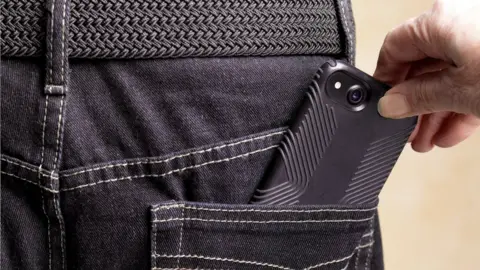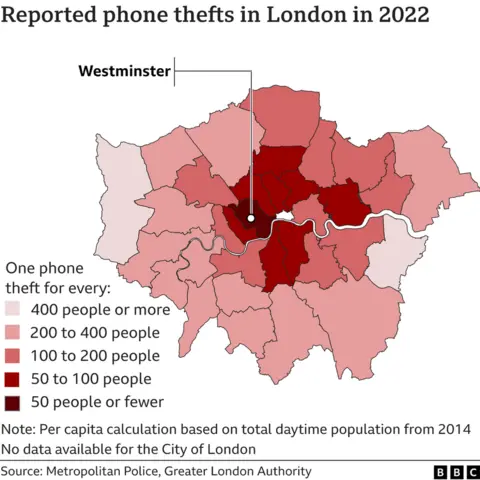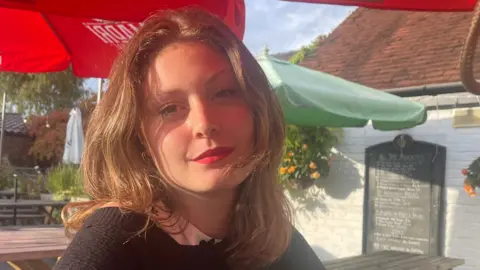Phone reported stolen in London every six minutes
 Peter Dazeley/Getty
Peter Dazeley/GettyA phone is reported stolen in London every six minutes, official figures show.
Data obtained by the BBC revealed 91,000 reports of phone theft in London in 2022, an average of 248 a day.
Two per cent of these reported thefts concluded with the recovery of a device.
The Metropolitan Police says policing the crime is "difficult" and that "daily operations" continue to take place.
The boroughs of Westminster (25,899), Camden (7,892), Southwark (5,690) and Hackney (4,618) saw the highest reported thefts, while Bexley (432) saw the fewest.
But recovery rates are equally low across the city, with key areas like Westminster (1.3%), Hackney (1.7%) and Camden (1.8%) all below the London-wide average.

Meanwhile, in January this year there were more than 8,500 reports of stolen phones, with 119 returned to their owners.
The independent inspector of police forces, His Majesty's Inspectorate of Constabulary (HMICFRS), told the BBC the charge rate for phone theft was "unacceptable and unsustainable".
HMCIFRS Chief Inspector Andy Cooke, said: "Phone theft is not a minor crime, it strikes at the heart of how safe people feel in their own communities.
"There needs to be a concerted drive to address this because it directly affects the public's confidence in the police's ability to keep them safe."
 Sharon Browne-Peter
Sharon Browne-PeterThe BBC has spoken to a number of people who reported their phone stolen to the police but never got it recovered.
In February, Sharon Browne-Peter, 26, had her phone snatched out of her hand by a man on a bike while waiting for a bus in Islington.
"I was sitting down and this guy with a delivery bag on his back just rolls past."
'Extremely traumatic'
The man approached Ms Browne-Peter, asking her age and where she was from.
"I did what any other girl would do, and took out my phone - then he just snatches it out of my hands and rides off."
She was left shocked and confused: "I've always thought this kind of stuff only happens in movies, it was extremely traumatic."
She quickly went back to the venue she had just come from and contacted the police.
The Met Police says: "It's important victims contact the police as soon as a robbery occurs, the 'Golden Hour' after a robbery is critical to catching robbers."
However, despite ringing immediately, she says the police told her to go home and "there was nothing they could do at this point".
Ms Browne-Peter, who runs a sickle-cell anaemia charity, managed to track the location of her phone and rang the police countless times: "They told me that there were hundreds of cases at that same address but there's nothing they can really do.
"So after that point, I just sort of left it."
Since then, she says he has felt less safe in London; "I literally was at a bus stop a few days ago, and I saw someone very similar to the guy that stole my phone, and I felt tense."
 Georgina Banham
Georgina BanhamThe Met has seen increased incidents of phone theft involving motorcycles, mopeds and bicycles, with over 40 reports of bike-based thefts a day last year.
Similarly to Ms Browne-Peter, Georgina Banham was robbed by a man on a bicycle in Walworth, south London. as she chatted on the phone to her father.
The 23-year-old says she felt "totally violated" following the incident.
"I'd just moved into my new flat and was walking to the supermarket in the evening, so I rang my dad.
"Someone came from behind, grabbed it and cycled away."
'Trust is non-existent'
Ms Banham headed straight back to her flat and filled in the Met's 'Report a Crime' page online, but received "an automated do-not-reply email and a case number, no-one ever phoned", she said.
The fear from the incident meant she "didn't leave the house for two days".
But it was the risk of losing personal data that scared her the most: "Knowing these people had access to my data was terrifying, your data is incredibly valuable."
Ms Banham was also able to track her phone's location, as it moved from London to Dubai and then to Shenzhen in China, but there was no further contact from the authorities.
"My trust in the police is non-existent," she said.

Follow BBC London on Facebook, Twitter and Instagram. Send your story ideas to [email protected]
